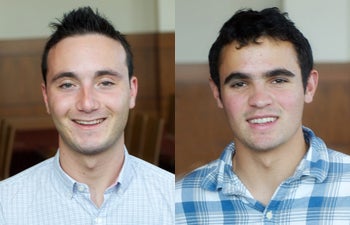Students Take on Gun Control
David Meister, international relations major in USC Dornsife, believes in the Second Amendment. He said those cleared and not psychologically unstable should be permitted to carry a firearm.
“That being said, I’m hopeful that policy will reduce the number of high-capacity magazine clips, and we can limit the number of automatic — not assault, but automatic — weapons.”
Meister voiced his opinion during a recent “Students Talk Back,” a weekly forum organized by the USC Dornsife’s Jesse M. Unruh Institute of Politics, USC Price School of Public Policy’s Tomás Rivera Policy Institute and USC Price’s Bedrosian Center on Governance and Public Enterprise.
The discussion was held after a streak of shootings and mass killings in the United States in recent months and years. Participants discussed gun policies, transportation safety and national security.
Andrew Myers, a political science major in USC Dornsife who grew up a five-minute drive from Aurora, Colo., site of the 2012 killing of 12 theatergoers, said firearms have drastically changed since the Second Amendment was created in 1776.
“Americans have a Second Amendment right to own a gun,” Myers said. “But it [boils down] to what kind of guns people are allowed to own and being responsible with them. The Second Amendment was created in 1776, and when you look at what guns were like then, they had muskets — you didn’t have the kinds of weapons you have today. As you look at how guns have progressed, the meaning of the Second Amendment and what it means to bear arms have changed.”
Students from all schools across campus are invited to the weekly discussions that take place each Wednesday at noon at the Ronald Tutor Campus Center, The Forum (RTCC 450).

USC Dornsife undergraduates David Meister and Andrew Myers expressed their opinions at the Feb. 6 “Students Talk Back” event. Photos by Dietmar Quistorf.
At the gun control debate, panelist Erroll Southers MPA ’98, said the recent mass shootings should encourage the nation to consider better tracking of gun ownership.
“There’s at least a minimal expectation of control in regard to who owns a firearm,” said Southers, associate director of USC’s National Homeland Security Center for Risk and Economic Analysis of Terrorism Events and a former law enforcement official.
“It’s the same as who owns a car, who owns a house,” Southers said. Information about who owns guns should probably remain out of the public record, “but someone needs to at least know who has those weapons. If there’s some reason someone wants to own a gun and they don’t want anyone else to know about it, we’d want to know why you feel that way.”
Discussion over any form of gun control is heated because the power to own firearms is guaranteed to Americans under the Bill of Rights, and the issue reaches back into the nation’s history and psyche.
“The issue of control gets to the heart of America’s formation — the constitution, revolution, a lot of it was around control,” said moderator Raphael Bostic, director of the USC Judith and John Bedrosian Center on Governance and the Public Enterprise.
But Southers cited the 1999 Columbine High School massacre, in which 12 students and a teacher were killed by two young gunmen, as an example of why the country must think about guns’ costs.
“Columbine was a game-changer,” said Southers, a former FBI SWAT agent. “There have been 182 school shootings since Columbine.”
Any changes in gun policy will require soul-searching and compromise, he noted. “When we say ‘gun control,’ gun control as a phrase already tends to have people draw the line and take sides,” he said.
The “Students Talk Back” events bring experts together in a forum for discussion with students and USC community members. At each forum, free food is served at 11:30 a.m. and the discussion begins at noon.